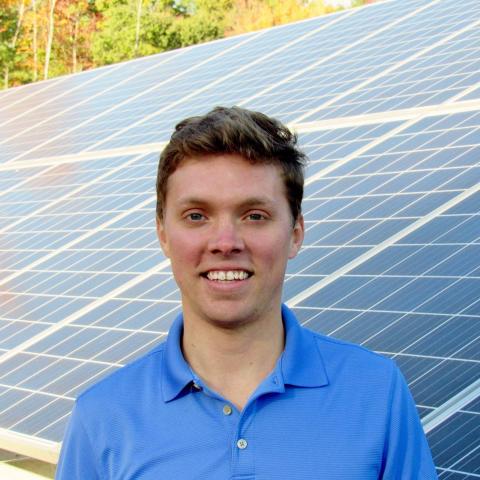Tackling Issues through Learned Skills

Matt Doubleday '15 applies his passion for sustainability towards his career
When Matt Doubleday '15 (Business Administration with Options in Accounting and Entrepreneurial Studies) first pitched his idea at the Social Venture Innovation Challenge in 2013, he was among the first group of students to participate. A decade later, Matt has built upon his experience with the solar energy industry, and shares his journey with the Sustainability Institute.
You entered the 2013 SVIC – the very first year of the competition. Why did you decide to enter and what was your idea/solution that you pitched?
A friend and I entered the Holloway Competition the previous spring with an idea for a crowdfunding solar company that would allow community members to invest in and receive returns from a local solar project. My friend's brother, who I still work with today, had the idea. The three of us decided to enter the idea in the SVIC through the community track so that we could all participate in the competition and continue to receive feedback on the concept. Our work today is slightly different, but the idea that we presented through the SVIC is what eventually turned into the original venture - SunRaise Investments - and now our new venture - ReWild Renewables.
What was your biggest takeaway, or a-ha moment, from the SVIC process?
For me, it was that one does need to know, or strive to know, every detail about their idea or solution, but must take a different perspective when presenting to potential investors (or in this case, judges). We end up learning a lot of new information when turning an idea into a business plan, and we can often get stuck focusing on very specific details when attempting to communicate our solution. These factors are important to the success of the venture, but do not necessarily need to make their way into an investor presentation. It's important to take the perspective of the investor during these opportunities. Do they care about the industry lingo, acronyms and specific details that only one who works in the industry would know? They certainly care that you know that information, but you only have so much time with a potential investor. You need to tell a story more than anything and present a succinct explanation of the problem and how your idea will provide a scalable and successful solution. If they have questions about the details, well then that is your opportunity to wow them with your in-depth knowledge.
Tell us a bit about your work with ReWild today.
Working for a small company means you wear many hats. The main two job functions I have today are working with electric utilities to interconnect our projects and developing on-site rewilding plans. I enjoy that these are very different functions. Interconnection has become the biggest development hurdle for renewable energy projects like solar. The electric grid is older and needs to be updated if renewable energy is to be successful. There are many people working hard on making interconnection easier and more streamlined but it is big problem that involves many different stakeholders with competing incentives and opinions. On the other side of responsibilities, the development of on-site rewilding plans is newer to the industry (for us) and is a great way to ensure that our development efforts have a tangible ecological benefit long after they are built and begin generating clean renewable energy.
What’s unique about ReWild? And why is that important?
ReWild takes an approach to solar energy development that is based on maintaining strong and honest relationships with landowners, municipalities and other key stakeholders in the development process. This is the case for many reputable solar development groups but what is unique about ReWild is our approach to conservation minded solar development. We invest additional capital into on-site rewilding efforts which includes planting native wildflowers and grasses that are pollinator friendly, rather than a standard grass seed mix. Additionally, ReWild donates proceeds from our business each year to permanently protect important biodiverse lands. In 2021, Rewild gifted $100,000 to The Nature Conservancy to help conserve four unique and ecologically important pieces of land. Two in Maine, one in West Virginia, and one in Kenya.
What advice would you give to your 2013-self and/or to current UNH students interested in contributing to a sustainable future through their careers, or their personal lives?
It can be incredibly useful to have a skill when tackling our world's problems. I majored in accounting and entrepreneurial studies. The accounting education helped me to better understand financial transactions and has benefited me greatly in my career in solar energy finance and development. I know and work with many people in the industry that majored in finance, engineering, policy, communication, and many other fields of study. Like me, they didn't directly learn about solar energy. They studied another field and applied what they learned to solving problems in the solar energy industry. Learning about sustainability and the problems that need sustainable solutions is incredibly useful but tackling those problems can be made so much easier if you have studied a skill that can be applied to your venture.
